Qingyang Mao
BLADE: A Behavior-Level Data Augmentation Framework with Dual Fusion Modeling for Multi-Behavior Sequential Recommendation
Dec 15, 2025Abstract:Multi-behavior sequential recommendation aims to capture users' dynamic interests by modeling diverse types of user interactions over time. Although several studies have explored this setting, the recommendation performance remains suboptimal, mainly due to two fundamental challenges: the heterogeneity of user behaviors and data sparsity. To address these challenges, we propose BLADE, a framework that enhances multi-behavior modeling while mitigating data sparsity. Specifically, to handle behavior heterogeneity, we introduce a dual item-behavior fusion architecture that incorporates behavior information at both the input and intermediate levels, enabling preference modeling from multiple perspectives. To mitigate data sparsity, we design three behavior-level data augmentation methods that operate directly on behavior sequences rather than core item sequences. These methods generate diverse augmented views while preserving the semantic consistency of item sequences. These augmented views further enhance representation learning and generalization via contrastive learning. Experiments on three real-world datasets demonstrate the effectiveness of our approach.
Benchmarking Multimodal LLMs on Recognition and Understanding over Chemical Tables
Jun 13, 2025Abstract:Chemical tables encode complex experimental knowledge through symbolic expressions, structured variables, and embedded molecular graphics. Existing benchmarks largely overlook this multimodal and domain-specific complexity, limiting the ability of multimodal large language models to support scientific understanding in chemistry. In this work, we introduce ChemTable, a large-scale benchmark of real-world chemical tables curated from the experimental sections of literature. ChemTable includes expert-annotated cell polygons, logical layouts, and domain-specific labels, including reagents, catalysts, yields, and graphical components and supports two core tasks: (1) Table Recognition, covering structure parsing and content extraction; and (2) Table Understanding, encompassing both descriptive and reasoning-oriented question answering grounded in table structure and domain semantics. We evaluated a range of representative multimodal models, including both open-source and closed-source models, on ChemTable and reported a series of findings with practical and conceptual insights. Although models show reasonable performance on basic layout parsing, they exhibit substantial limitations on both descriptive and inferential QA tasks compared to human performance, and we observe significant performance gaps between open-source and closed-source models across multiple dimensions. These results underscore the challenges of chemistry-aware table understanding and position ChemTable as a rigorous and realistic benchmark for advancing scientific reasoning.
The Other Side of the Coin: Exploring Fairness in Retrieval-Augmented Generation
Apr 19, 2025Abstract:Retrieval-Augmented Generation (RAG) enhances Large Language Models (LLMs) by retrieving relevant document from external knowledge sources. By referencing this external knowledge, RAG effectively reduces the generation of factually incorrect content and addresses hallucination issues within LLMs. Recently, there has been growing attention to improving the performance and efficiency of RAG systems from various perspectives. While these advancements have yielded significant results, the application of RAG in domains with considerable societal implications raises a critical question about fairness: What impact does the introduction of the RAG paradigm have on the fairness of LLMs? To address this question, we conduct extensive experiments by varying the LLMs, retrievers, and retrieval sources. Our experimental analysis reveals that the scale of the LLMs plays a significant role in influencing fairness outcomes within the RAG framework. When the model scale is smaller than 8B, the integration of retrieval mechanisms often exacerbates unfairness in small-scale LLMs (e.g., LLaMA3.2-1B, Mistral-7B, and LLaMA3-8B). To mitigate the fairness issues introduced by RAG for small-scale LLMs, we propose two approaches, FairFT and FairFilter. Specifically, in FairFT, we align the retriever with the LLM in terms of fairness, enabling it to retrieve documents that facilitate fairer model outputs. In FairFilter, we propose a fairness filtering mechanism to filter out biased content after retrieval. Finally, we validate our proposed approaches on real-world datasets, demonstrating their effectiveness in improving fairness while maintaining performance.
Enhancing Table Recognition with Vision LLMs: A Benchmark and Neighbor-Guided Toolchain Reasoner
Dec 30, 2024



Abstract:Pre-trained foundation models have recently significantly progressed in structured table understanding and reasoning. However, despite advancements in areas such as table semantic understanding and table question answering, recognizing the structure and content of unstructured tables using Vision Large Language Models (VLLMs) remains under-explored. In this work, we address this research gap by employing VLLMs in a training-free reasoning paradigm. First, we design a benchmark with various hierarchical dimensions relevant to table recognition. Subsequently, we conduct in-depth evaluations using pre-trained VLLMs, finding that low-quality image input is a significant bottleneck in the recognition process. Drawing inspiration from these findings, we propose the Neighbor-Guided Toolchain Reasoner (NGTR) framework, which is characterized by integrating multiple lightweight models for low-level visual processing operations aimed at mitigating issues with low-quality input images. Specifically, we utilize a neighbor retrieval mechanism to guide the generation of multiple tool invocation plans, transferring tool selection experiences from similar neighbors to the given input, thereby facilitating suitable tool selection. Additionally, we introduce a reflection module to supervise the tool invocation process. Extensive experiments on public table recognition datasets demonstrate that our approach significantly enhances the recognition capabilities of the vanilla VLLMs. We believe that the designed benchmark and the proposed NGTR framework could provide an alternative solution in table recognition.
PoTable: Programming Standardly on Table-based Reasoning Like a Human Analyst
Dec 05, 2024



Abstract:Table-based reasoning has garnered substantial research interest, particularly in its integration with Large Language Model (LLM) which has revolutionized the general reasoning paradigm. Numerous LLM-based studies introduce symbolic tools (e.g., databases, Python) as assistants to extend human-like abilities in structured table understanding and complex arithmetic computations. However, these studies can be improved better in simulating human cognitive behavior when using symbolic tools, as they still suffer from limitations of non-standard logical splits and constrained operation pools. In this study, we propose PoTable as a novel table-based reasoning method that simulates a human tabular analyst, which integrates a Python interpreter as the real-time executor accompanied by an LLM-based operation planner and code generator. Specifically, PoTable follows a human-like logical stage split and extends the operation pool into an open-world space without any constraints. Through planning and executing in each distinct stage, PoTable standardly completes the entire reasoning process and produces superior reasoning results along with highly accurate, steply commented and completely executable programs. Accordingly, the effectiveness and explainability of PoTable are fully demonstrated. Extensive experiments over three evaluation datasets from two public benchmarks on two backbones show the outstanding performance of our approach. In particular, GPT-based PoTable achieves over 4% higher absolute accuracy than runner-ups on all evaluation datasets.
TableTime: Reformulating Time Series Classification as Zero-Shot Table Understanding via Large Language Models
Nov 24, 2024



Abstract:Large language models (LLMs) have demonstrated their effectiveness in multivariate time series classification (MTSC). Effective adaptation of LLMs for MTSC necessitates informative data representations. Existing LLM-based methods directly encode embeddings for time series within the latent space of LLMs from scratch to align with semantic space of LLMs. Despite their effectiveness, we reveal that these methods conceal three inherent bottlenecks: (1) they struggle to encode temporal and channel-specific information in a lossless manner, both of which are critical components of multivariate time series; (2) it is much difficult to align the learned representation space with the semantic space of the LLMs; (3) they require task-specific retraining, which is both computationally expensive and labor-intensive. To bridge these gaps, we propose TableTime, which reformulates MTSC as a table understanding task. Specifically, TableTime introduces the following strategies: (1) convert multivariate time series into a tabular form, thus minimizing information loss to the greatest extent; (2) represent tabular time series in text format to achieve natural alignment with the semantic space of LLMs; (3) design a reasoning framework that integrates contextual text information, neighborhood assistance, multi-path inference and problem decomposition to enhance the reasoning ability of LLMs and realize zero-shot classification. Extensive experiments performed on 10 publicly representative datasets from UEA archive verify the superiorities of the TableTime.
DisenTS: Disentangled Channel Evolving Pattern Modeling for Multivariate Time Series Forecasting
Oct 30, 2024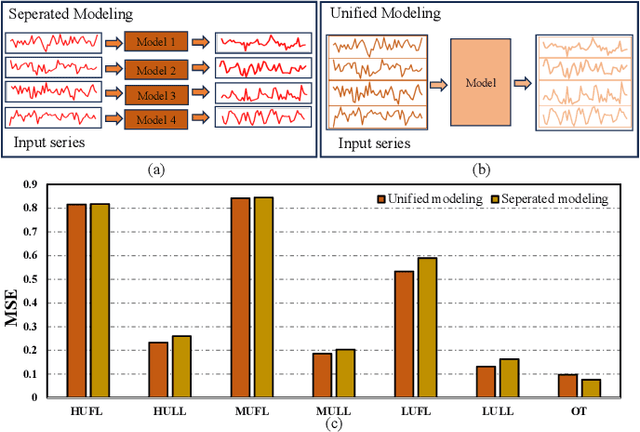
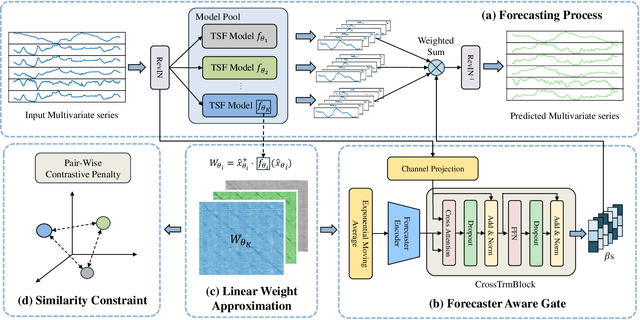

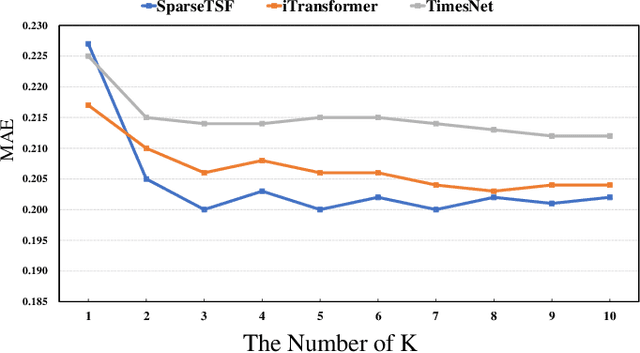
Abstract:Multivariate time series forecasting plays a crucial role in various real-world applications. Significant efforts have been made to integrate advanced network architectures and training strategies that enhance the capture of temporal dependencies, thereby improving forecasting accuracy. On the other hand, mainstream approaches typically utilize a single unified model with simplistic channel-mixing embedding or cross-channel attention operations to account for the critical intricate inter-channel dependencies. Moreover, some methods even trade capacity for robust prediction based on the channel-independent assumption. Nonetheless, as time series data may display distinct evolving patterns due to the unique characteristics of each channel (including multiple strong seasonalities and trend changes), the unified modeling methods could yield suboptimal results. To this end, we propose DisenTS, a tailored framework for modeling disentangled channel evolving patterns in general multivariate time series forecasting. The central idea of DisenTS is to model the potential diverse patterns within the multivariate time series data in a decoupled manner. Technically, the framework employs multiple distinct forecasting models, each tasked with uncovering a unique evolving pattern. To guide the learning process without supervision of pattern partition, we introduce a novel Forecaster Aware Gate (FAG) module that generates the routing signals adaptively according to both the forecasters' states and input series' characteristics. The forecasters' states are derived from the Linear Weight Approximation (LWA) strategy, which quantizes the complex deep neural networks into compact matrices. Additionally, the Similarity Constraint (SC) is further proposed to guide each model to specialize in an underlying pattern by minimizing the mutual information between the representations.
DV-FSR: A Dual-View Target Attack Framework for Federated Sequential Recommendation
Sep 10, 2024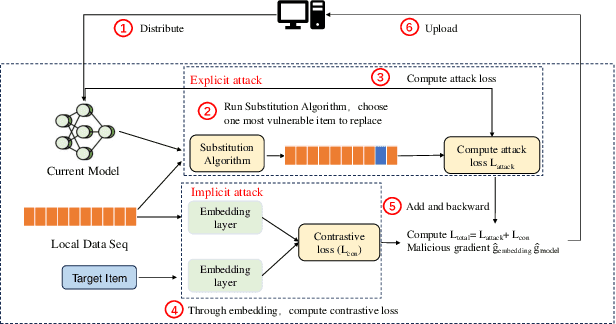
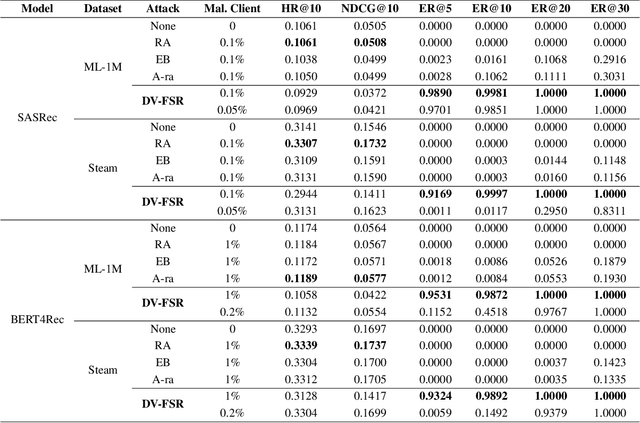

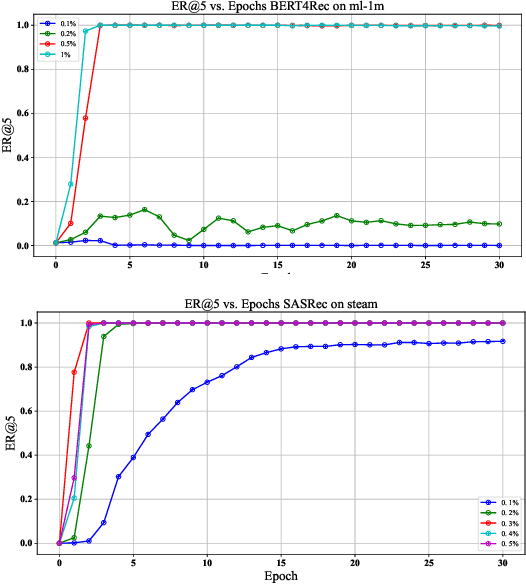
Abstract:Federated recommendation (FedRec) preserves user privacy by enabling decentralized training of personalized models, but this architecture is inherently vulnerable to adversarial attacks. Significant research has been conducted on targeted attacks in FedRec systems, motivated by commercial and social influence considerations. However, much of this work has largely overlooked the differential robustness of recommendation models. Moreover, our empirical findings indicate that existing targeted attack methods achieve only limited effectiveness in Federated Sequential Recommendation (FSR) tasks. Driven by these observations, we focus on investigating targeted attacks in FSR and propose a novel dualview attack framework, named DV-FSR. This attack method uniquely combines a sampling-based explicit strategy with a contrastive learning-based implicit gradient strategy to orchestrate a coordinated attack. Additionally, we introduce a specific defense mechanism tailored for targeted attacks in FSR, aiming to evaluate the mitigation effects of the attack method we proposed. Extensive experiments validate the effectiveness of our proposed approach on representative sequential models.
Efficiently Measuring the Cognitive Ability of LLMs: An Adaptive Testing Perspective
Jun 18, 2023Abstract:Large language models (LLMs), like ChatGPT, have shown some human-like cognitive abilities. For comparing these abilities of different models, several benchmarks (i.e. sets of standard test questions) from different fields (e.g., Literature, Biology and Psychology) are often adopted and the test results under traditional metrics such as accuracy, recall and F1, are reported. However, such way for evaluating LLMs can be inefficient and inaccurate from the cognitive science perspective. Inspired by Computerized Adaptive Testing (CAT) used in psychometrics, we propose an adaptive testing framework for LLM evaluation. Rather than using a standard test set and simply reporting accuracy, this approach dynamically adjusts the characteristics of the test questions, such as difficulty, based on the model's performance. This allows for a more accurate estimation of the model's abilities, using fewer questions. More importantly, it allows LLMs to be compared with humans easily, which is essential for NLP models that aim for human-level ability. Our diagnostic reports have found that ChatGPT often behaves like a ``careless student'', prone to slip and occasionally guessing the questions. We conduct a fine-grained diagnosis and rank the latest 6 instruction-tuned LLMs from three aspects of Subject Knowledge, Mathematical Reasoning, and Programming, where GPT4 can outperform other models significantly and reach the cognitive ability of middle-level students. Different tests for different models using efficient adaptive testing -- we believe this has the potential to become a new norm in evaluating large language models.
 Add to Chrome
Add to Chrome Add to Firefox
Add to Firefox Add to Edge
Add to Edge